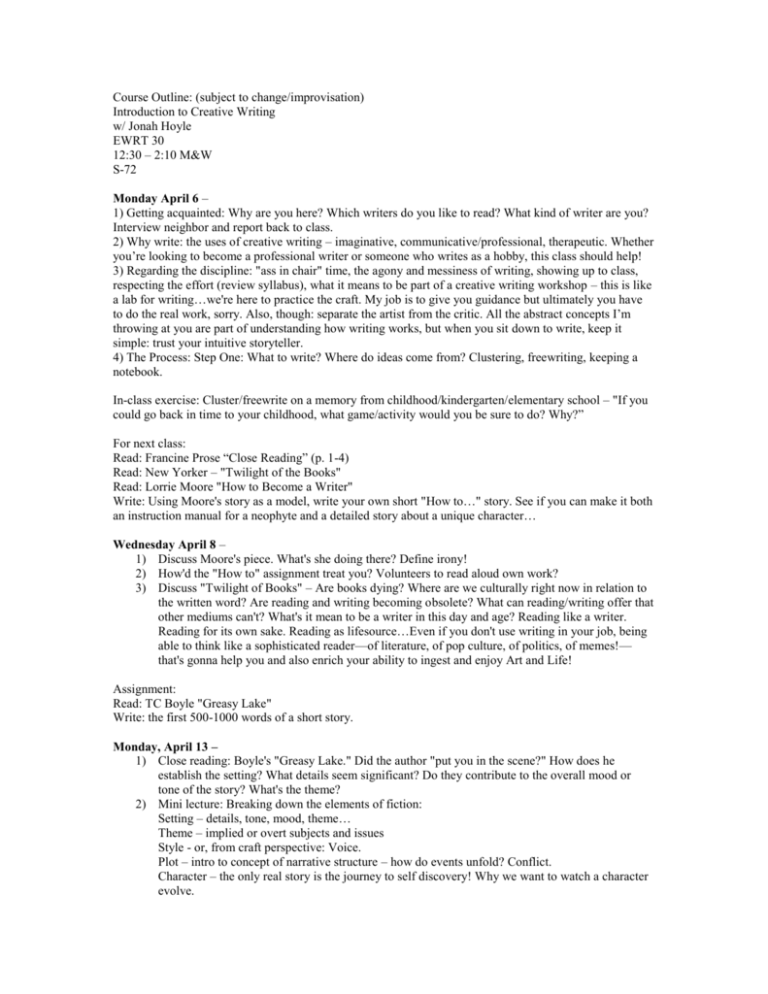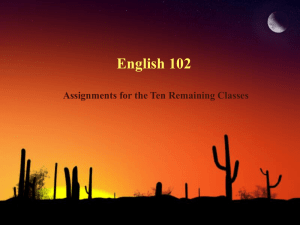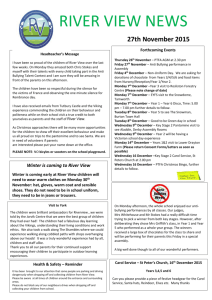Course Schedule
advertisement

Course Outline: (subject to change/improvisation)
Introduction to Creative Writing
w/ Jonah Hoyle
EWRT 30
12:30 – 2:10 M&W
S-72
Monday April 6 –
1) Getting acquainted: Why are you here? Which writers do you like to read? What kind of writer are you?
Interview neighbor and report back to class.
2) Why write: the uses of creative writing – imaginative, communicative/professional, therapeutic. Whether
you’re looking to become a professional writer or someone who writes as a hobby, this class should help!
3) Regarding the discipline: "ass in chair" time, the agony and messiness of writing, showing up to class,
respecting the effort (review syllabus), what it means to be part of a creative writing workshop – this is like
a lab for writing…we're here to practice the craft. My job is to give you guidance but ultimately you have
to do the real work, sorry. Also, though: separate the artist from the critic. All the abstract concepts I’m
throwing at you are part of understanding how writing works, but when you sit down to write, keep it
simple: trust your intuitive storyteller.
4) The Process: Step One: What to write? Where do ideas come from? Clustering, freewriting, keeping a
notebook.
In-class exercise: Cluster/freewrite on a memory from childhood/kindergarten/elementary school – "If you
could go back in time to your childhood, what game/activity would you be sure to do? Why?”
For next class:
Read: Francine Prose “Close Reading” (p. 1-4)
Read: New Yorker – "Twilight of the Books"
Read: Lorrie Moore "How to Become a Writer"
Write: Using Moore's story as a model, write your own short "How to…" story. See if you can make it both
an instruction manual for a neophyte and a detailed story about a unique character…
Wednesday April 8 –
1) Discuss Moore's piece. What's she doing there? Define irony!
2) How'd the "How to" assignment treat you? Volunteers to read aloud own work?
3) Discuss "Twilight of Books" – Are books dying? Where are we culturally right now in relation to
the written word? Are reading and writing becoming obsolete? What can reading/writing offer that
other mediums can't? What's it mean to be a writer in this day and age? Reading like a writer.
Reading for its own sake. Reading as lifesource…Even if you don't use writing in your job, being
able to think like a sophisticated reader—of literature, of pop culture, of politics, of memes!—
that's gonna help you and also enrich your ability to ingest and enjoy Art and Life!
Assignment:
Read: TC Boyle "Greasy Lake"
Write: the first 500-1000 words of a short story.
Monday, April 13 –
1) Close reading: Boyle's "Greasy Lake." Did the author "put you in the scene?" How does he
establish the setting? What details seem significant? Do they contribute to the overall mood or
tone of the story? What's the theme?
2) Mini lecture: Breaking down the elements of fiction:
Setting – details, tone, mood, theme…
Theme – implied or overt subjects and issues
Style - or, from craft perspective: Voice.
Plot – intro to concept of narrative structure – how do events unfold? Conflict.
Character – the only real story is the journey to self discovery! Why we want to watch a character
evolve.
3) Talk about writing first 1000 words – volunteers to read aloud? Discuss work. Did they establish the
setting? How? What about the character? Is there a conflict on the horizon?
Assignment:
Write: Either build on your existing story or begin a new one. Establish the setting and introduce the main
character. Give him or her some type of conflict—either internal or external (or both!) If you're rolling,
keep going with the story as far as you can. If not, try to get at least 1000 words on paper and bring it to
class on Wednesday.
Or: Write two pages about your family. Describe some of the conflicts between family members. Which is
the most complicated? Which would you most want to explore as a story? Be prepared to read your work
aloud.
Read: David Foster Wallace “Brief Interviews with Hideous Men”
Read: Raymond Carver “Popular Mechanics” and “On writing”
Wednesday, April 15 –
1) Mini lecture: Tone, Style, Diction, Voice – how we infer what the author feels about his/her
characters (tone); how different writers convey meaning (style – compare R. Carver (minimalist)
vs. DFW. Also discuss: POV – 1st vs. 3rd person.
2) Small group exercise: in groups of 3, each person reads his/her piece aloud. Others listen and note
instances of style/word choice that seem significant. Are there certain words that do a lot of heavy
lifting in terms of establishing style and tone? Are there certain words that seem inconsistent with
the style/voice being established?
Assignment:
Write: Record a conversation/argument/dialogue exchange you've had recently. OR: write a 1 st person
monologue (in the style of “Brief Interviews…”).
Here's where we fell behind. So I'm just gonna change the dates.
For Monday:
Read: Tim O'Brien "Sweetheart of the Song Tra Bong"
Read: The two stories from your classmates.
Write: 1 page "Reader Response" to "Sweetheart" that analyzes O'Brien's style (diction and syntax) and
voice (diction, syntax, worldview) and themes and whatever else you think is significant…
Write: half-page critiques of Joe's story; half page critique of Alix's story.
Monday, April 27 –
1) Problems with writing so far? How’s the process going? Painful? Good.
2) Discuss "Sweetheart" – what's O'Brien saying? Allegory, Symbol, Metaphor. Also: How does his
tone/style/diction let us know what he's going for? Close reading.
3) Mini lecture: Plot! How to create a dramatic situation – internal vs. external conflict (characterdriven vs. circumstance-driven plots); exposition – what it is (summary/backstory), how to
minimize it ("bring her on and let her scream" – Twain); suspense ('the pleasurable anxiety") and
foreshadowing; complication (plot points); protagonist vs. antagonist; classical dramatic structure:
exposition, complication, climax, conclusion, resolution (denouement "untying of the knot");
flashbacks, flashforward; epiphany – character's moment of decision…too much for one day?
4) Critiques of student work.
Assignment:
Read: George Saunders “The Barber’s Unhappiness”
Write: Reader Response: Define Saunders’ style. Bonus points: does the story ring true on a basic human
level despite (or because of) Saunders’ style? Also: what’s the POV and where does he switch? Why is this
significant?
Wednesday, April 29 –
Discuss: “The Barber’s Unhappiness” – How is POV important to this story? What clues do we get about
what he thinks of his main character? Is there a moral to this story?
Mini lecture: Character! Stock characters vs. rounded characters, cliché and stereotype; character
descriptions - sketching vs. sculpting), giving a character sufficient motivation, making characters evolve
(fixed vs. static characters), hero vs. antihero, bringing your character to a point of crisis or epiphany…
Small group exercise: Look at the stories we've read so far and identify the protagonist, his/her main
characteristics, his/her internal and external conflicts and motivation. Present to class!
Assignment: Finish a draft of your first story. Bring three PRINTED OUT copies to class on Monday.
Monday, May 4 –
Discuss: Critique, Feedback, Taking Feedback, Using Feedback (Not using feedback) aka - Revision (“heat
seeking” – Saunders)
Then: Break up into groups of three. Students read each other's work (author reads aloud, others follow
along and mark page). Others offer critique.
Assignment: Having noted the critique of your peers, revise your story. On Wednesday you'll turn in both
the original and the revised versions, along with a brief "writer's memo" that explains what you're trying to
do, what you think works about your story, what you think doesn't work.
Wednesday, May 6 –
Turn in short story and notebook/portfolio so far.
Now let's shift gears and start talking about Nonfiction.
Mini lecture: What is nonfiction? The spectrum: from straight journalism to new journalism
(backdoor/narrative journalism - excerpts: Tom Wolfe, Joan Didion, Hunter Thompson, Norman Mailer) to
formal essays to personal essays and memoir and beyond… A brief history of nonfiction writing… the art
of observing. Picking out the significant details from real life.
In class exercise: describe your bedroom. What’s on your walls? What objects say the most about who you
are? If a visitor (me, let’s say) came to your bedroom, what would you show him (me)?
Assignment:
Read: Ryan Lizza, “Talk of the Town”
Write: Go to a public place or public event. Watch, listen, feel, smell – use the 5 senses to observe and
record details. This can be done in your notebook and does not need to be turned in, yet.
Monday, May 11 –
Discuss: Lizza – how does he use real life details of setting to convey his point? What does it mean to be
prescient?
In class exercise: Using your notes, try to turn your recorded observations into a paragraph that uses details
to tell us something about the setting you observed. Discuss/share with class.
Then: Freewrite! Projected? Picture of female model; picture of Barry Bonds. Write some thoughts about
one or the other (or both). Then share. Then discuss. What do these images signify?
Assignment:
Read: Susan Sontag "A Woman's Beauty: Put Down or Power Source?" (excerpt)
Read: Lee Klein "All Aboard the Bloated Boat: Arguments in Favor of Barry Bonds"
Write: After reading these essays, do you want to add to or change the ideas you had based on the initial inclass freewrite? In a paragraph or a page, summarize your thoughts and how they've changed or stayed the
same.
Wednesday, May 13 –
Mini lecture: Personal essay and memoir – how to move between scene and exposition in personal essay.
Close reading: Richard Wright’s "Writing and Reading."
Mini lecture: The "plot" of an essay (evolution of an idea; showing the thought process) vs. plot of a story:
keeping the reader hooked and adding complications.
In-class: Clustering/freewriting: are there stories from your own life that you think would make for good
personal essays? After 10-12 minutes of brainstorming, share some with class. Class: push writer to think
not only about the mechanics of storytelling, but also about the potential meaning of the anecdote or story
he/she would like to explore.
Assignment:
Write: Begin a personal essay that answers the question: “How I became _____” Try to combine narrative
storytelling with analytic reflection. This can be done in your notebook or typed—does not need to be
turned in on Monday.
Read: D. Winston Brown "Ghost Children"
Monday, May 18 –
Discuss: "Ghost Children" – True? Effective? Using a personal story to explore broader issues of race, class
identity, selfhood, soul. How might your personal story be connected to a larger set of issues/ideas?
Then: Discuss/Share process of writing personal essays – how are they progressing? Who needs help? It’s
okay if all this sounds like nonsense: remember, separate the artist from the critic.
Assignment:
Read: Rodney Rothman “My Fake Job”
Write: Work on that essay…
Wednesday, May 20 –
Discuss: "My Fake Job" (originally published as nonfiction, then revealed to be untrue). Ethics? Discuss
Fry etc. Also: persona, the “character” of nonfiction writing. Humor. Writing about real life. Turning real
people into characters. Omniscient perspective in nonfiction – ethical? Where to draw the line on Truth.
In class exercise: the interview. Techniques for eliciting information from strangers. Making them feel
comfortable (active listening). Interview each other. Take notes. Report back.
Assignment: finish essay. Bring three PRINTED OUT copies to class on Monday.
Monday, May 25 – Memorial Day!
Wednesday, May 27 –
Peer review of personal essays.
Assignment: Revise your essay to be turned in on Monday, along with your writer’s notebook/portfolio.
Monday, June 1 –
Turn in essay. Turn in notebooks/portfolio so far.
Special guest star: Dan Hoyle, solo performer, brother…
Assignment: Read “Hello Out there”
Write: Brainstorm/cluster/freewrite ideas for a one act play or a short or feature-length film. Write two
pages of stage directions and dialogue.
Wednesday, June 3 –
Mini lecture: Elements of Dramatic Narrative – dramatic structure, three acts, plot points, subplots, conflict,
dramatic irony, suspense, reversals…gun on the wall (set up, knock down), dramatic questions – the hook
(like premise in fiction). But really: forget all this and start with a scene. Then write another…discover the
story; it’s more fun that way.
Discuss: have we all seen, say, Slumdog Millionaire? How does it obey the rules of dramatic narrative?
In-class exercise: either begin a new scene, with different characters, or continue to work on your existing
scene. Try to set up a conflict that will lead to a climactic moment…
Assignment:
Read: First half of Michael Clayton
Write: Continue your one-act play or film. No need to turn anything in, yet.
Wednesday, June 3 –
Film: Writing a treatment. Pitching ideas. In class: pitch me your film ideas!
Watch: First half of Michael Clayton – note how plot unfolds, pacing – how is it conventional in a dramatic
sense? How does it use all the “elements of fiction” to enrich the story? We’ll talk as we watch…
Assignment:
Write: Continue your one act or film.
Optional: Finish Michael Clayton script…(it’s not that long!)
Monday, June 8 –
Finish watching Michael Clayton. Discuss narrative strategies, use of secondary characters, dialogue
sharpness, how scenes do multiple things at once (character development simultaneous with plot dev); does
this movie have soul? Why or why not?
Assignment:
Finish your one act or film (or piece of longer script). Bring enough PRINTED OUT copies of the script so
that each character/actor can have a script and we can read the aloud in class on Monday.
Wednesday, June 10 –
Staged Readings!
Monday, June 22 –
Staged readings continued!
Wednesday, June 24 –
Wild card class! Turn in final story, essay, play, and writer’s notebook/portfolio.





